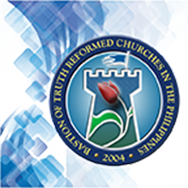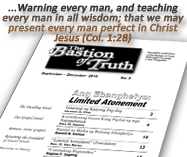

Some knowledge of the historical controversy between Calvinists and Arminians will help us understand the crucial issues raised in this controversy. The following brief summary is for the benefit of those who know little or nothing about it.
Calvinists are so-called because they accept the teaching of the French Reformer John Calvin (1509 - 1564). Arminians believe the teachings of a Dutch professor called Jacobus Arminius (1560 - 1609). After Arminius died, his followers set down his teaching in five points. Here they are in brief:
In 1618, over fifty years after the death of Calvin, the Synod of Dort (Dordrecht) was convened to debate these five points and after careful study of the Scriptures, rejected them and condemned Arminianism as heresy. The Synod published five points of its own, answering the Arminian beliefs, point by point. These came to be known as the five points of Calvinism. In some ways this is misleading because it gives the impression that Calvin taught nothing else but the five points. Anyone who has read his Institutes of the Christian Religion will know that this is not the case. They are a comprehensive study of the whole range of Christian truth.
It will be seen at once that the five points hang together. To deny one is to deny them all. The letters of the word TULIP are commonly used as an aid to memory:
This means that man is spiritually 'dead' and that sin has affected every part of his being, so that he has no natural ability to turn to or 'choose' Christ (Romans 3:10-18; Ephesians 2:1-3).
God works in the hearts of all whom he chooses (unconditionally, that is, not conditioned upon 'foreseen' faith in them) before the foundation of the world and gives them the ability to repent and believe. (Acts 13:48; Ephesians 1:4)
Christ died for and only for those whom God has eternally chosen and will save every one of them. The use of the word ‘limited’ must not be taken to mean that God is niggardly with his salvation. On the contrary, the apostle John tells us that in his vision of the redeemed church he saw ‘a great multitude that no-one could count, from every nation, people and language’' (Revelation 7: 9). Nor does the word ‘limited’ suggest any restriction in Christ’s power to save all who turn to him. For these reasons many have preferred to use the term ‘Particular Redemption.’ (John 10:11, 14)
God does not force those whom he chooses to repent and believe but draws them so lovingly to himself that they find his grace irresistible. (John 6:44, 63-65)
Although they will pass through many trials and temptations, everyone whom God chooses will persevere to the end. Not one of them will be lost (Romans 8:28-30).
Calvin was not the first to draw the church’s attention to these truths. Indeed, he was greatly influenced by the writings of Augustine (354 – 430). But the label ‘Calvinist’ has stuck because of Calvin’s brillant and painstaking study of Scripture on these matters. Augustine was in conflict with the Pelagians of his day (so named after a lay monk by the name of Pelagius) over the same basic issues. Pelagius taught that the sin of Adam did not affect anyone but himself so that all who are born into the world may live sinless lives if they so choose. He insisted that God cannot demand from his creatures any duty that they cannot perform. Pelagianism is not only in conflict with the Scriptures (Romans 5: 12) but contradicts the experience of every person born into this world.
No doubt some will complain that nothing is to be gained by raising old controversies. There are those who warn the ‘Calvinists’ of going to ‘extreme.’ But the truth of the matter is, Calvinism is the Gospel and the Gospel is the Truth. Arminianism is not another way of interpreting the Gospel, it is an-‘other’ gospel, therefore a false gospel. The big lie is the error of Arminianism (Gal. 1:6-9). If there are those who suggest that Calvinists should remain silent about their evangelical beliefs, it betrays their ignorance of the importance of the issues at stake. Belief or non-belief in the True Gospel is a matter of life and death (2 Thess. 2:13, 14)! Calvinists believe that the defense of the five points is nothing less than the defense of the gospel itself.

A newsletter/journal published in Filipino (Tagalog dialect) as a ministry of the denomination of Bastion of Truth Reformed Churches in the Philippines. It is primarily a means of instruction as well as a medium to proclaim and explain the convictions of the BTRC concerning the Gospel of God's sovereign particular grace in salvation.

A newsletter/journal published in Filipino (Tagalog dialect) as a ministry of the denomination of Bastion of Truth Reformed Churches in the Philippines. It is primarily a means of instruction as well as a medium to proclaim and explain the convictions of the BTRC concerning the Gospel of God's sovereign particular grace in salvation.